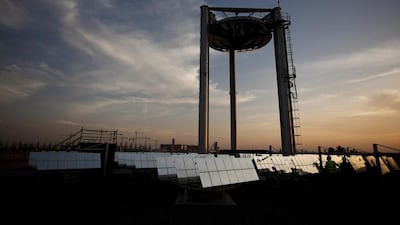Across the globe, cities are growing. By 2050, the United Nations forecasts that 66 per cent of the world's population will live in urban areas, with two of the UAE's key trading partners, India and China, expected to see the fastest rates of change. This shift to city living has enormous implications for all of us.
While cities are our economic powerhouses, driving development and diversification, they are also hugely demanding. Research by the Abu Dhabi-headquartered International Renewable Energy Agency suggests that cities account for 65 per cent of global energy use and generate up to 70 per cent of man-made carbon emissions.
As cities grow in number and size, so will their need for power and water and their subsequent emissions. Meeting that demand is a vital part of supporting increasing populations and the vibrant economic growth they contribute to, but it is all of our responsibilities to do so in an environmentally sustainable way.
Given that the World Energy Council has forecast energy consumption will rise by 46 per cent by 2060, with growth in the Middle East region expected to be higher than the global average, it is important that government, business and consumers alike all take a holistic approach to sustainably manage this growing energy demand.
The UAE is making great efforts to ensure sustainability is a pillar of its energy policy, taking a global leadership position through significant investments in renewable and clean energy projects. These include the Shams 1 solar plant inaugurated in 2013 and the Noor Abu Dhabi solar plant being developed today. And, of course, we are close to completing the Barakah nuclear plant.
The complex nature of these large infrastructure projects demonstrates how the development of a world-leading energy sector is a key part of the UAE’s strategy to diversify, drive the development of its knowledge economy and deliver sustainable energy sources. While this strategy is already delivering results, we must not be complacent that we are doing enough.
Together, we can all do more and it can be surprisingly simple. One of the quickest and least costly ways of tackling the environmental impact of our urban expansion is to look for greater energy efficiency. The International Energy Agency has suggested that energy efficiency measures alone could account for 49 per cent of the measures needed for global economies to stay in line with international climate change goals. We have placed this concept at the centre of our UAE Energy Plan 2050, which seeks to improve energy efficiency by close to 40 per cent.
_______________________
Read more from Opinion
ADNAN AMIN The falling cost of renewables brings new economic opportunity to the Gulf
RAZAN AL MUBARAK The Arabian Gulf is a living system that we need to preserve
AFSHIN MOLAVI One of the defining features of our century will be the rise of the Asian city
SAEED MOHAMMED AL TAYER It will require concerted effort to achieve a sustainable future
_______________________
Already our efforts are making a practical difference. The Ministry of Energy's Tarsheed initiative is encouraging consumers to use power and water more efficiently, with the aim of reducing consumption by 20 per cent by 2030 and saving 445,000 megawatt hours a year in the process. In a more direct intervention Abu Dhabi Municipality plans to replace more than 40,000 inefficient light fixtures, in one of the largest projects of its kind in the world. The replacement LEDs will be up to 90 per cent more efficient, cost 90 per cent less to maintain and will lead to an 80 per cent reduction in harmful CO2 emissions.
While these are great examples of what can be achieved with relatively simple measures, it is not enough for Government to meet the challenge of sustainability alone. The private sector too must engage with the issue if we are to meet our demanding targets. Fortunately, they may find much encouragement in the opportunities that continue to emerge from within the energy sector.
For example, efforts to reduce the considerable proportion of power consumed by buildings - some sources estimate it to be as much as 80 per cent in the Middle East - have led to the creation of a new kind of organisation, energy service companies, which combine the latest advances in sensor and monitoring technologies, with clever engineering and innovative performance-based contracts. Their aim is to deliver energy savings to asset owners, without that owner being exposed to the upfront capital costs of the technology and the retrofit. A happy sustainable side effect is extending the operational life of valuable built assets, while also boosting their economic productivity and competitiveness.
It is important that governments, businesses and utility providers all work together to find more such opportunities. Whether they create new business sectors to drive our economy, or deploy innovative technologies that conserve our resources, such cooperation and consultation can certainly fuel our sustainable energy solutions. With Abu Dhabi Sustainability Week taking place this week, we have an important chance to showcase our standing as a global hub for sustainable clean energy. It also offers a vital platform for sharing knowledge and encouraging international collaboration, especially with our key trading partners. There is much to be gained for all involved.
Awaidha Murshed Ali Al Marar is a member of the Abu Dhabi Executive Council and is the Chairman of the Abu Dhabi Department of Energy. He is among the speakers during Abu Dhabi Sustainability Week, which runs until January 20

